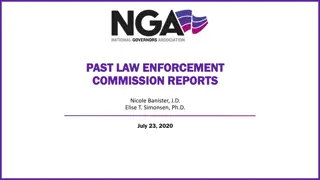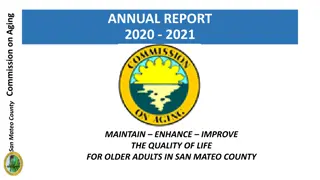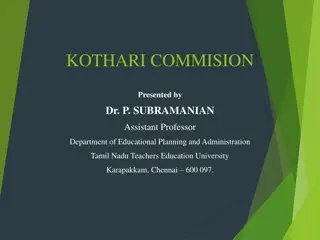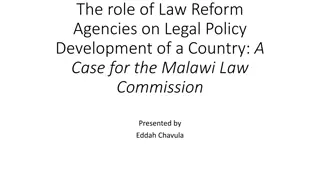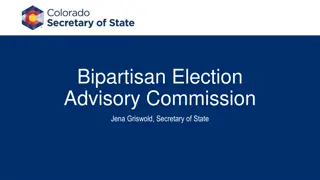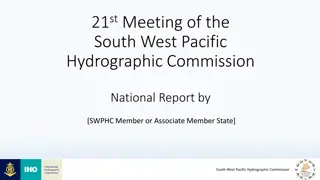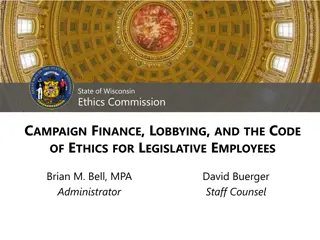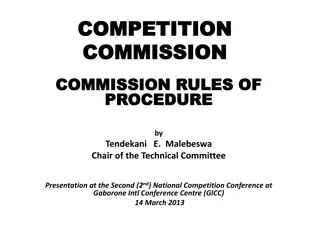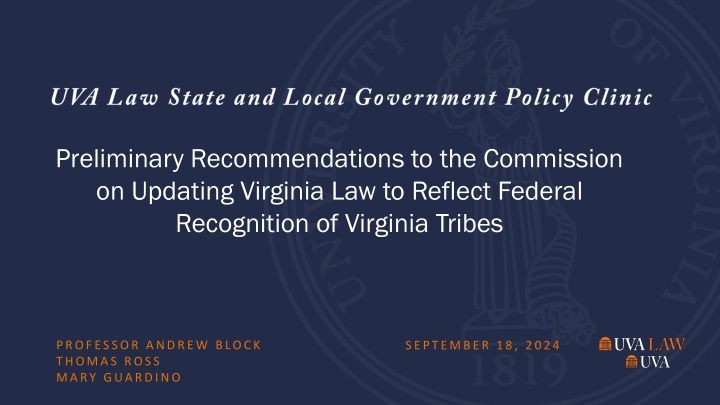
Virginia Law Update for Tribal Recognition: Preliminary Recommendations 2024
Explore proposed updates to Virginia law reflecting federal recognition of Virginia tribes, examining how other states define tribes, tribal members, and sovereignty. Learn about the Commission's role in maintaining government-to-government relationships with federally recognized Tribal Nations.
Download Presentation

Please find below an Image/Link to download the presentation.
The content on the website is provided AS IS for your information and personal use only. It may not be sold, licensed, or shared on other websites without obtaining consent from the author. If you encounter any issues during the download, it is possible that the publisher has removed the file from their server.
You are allowed to download the files provided on this website for personal or commercial use, subject to the condition that they are used lawfully. All files are the property of their respective owners.
The content on the website is provided AS IS for your information and personal use only. It may not be sold, licensed, or shared on other websites without obtaining consent from the author.
E N D
Presentation Transcript
Preliminary Recommendations to the Commission on Updating Virginia Law to Reflect Federal Recognition of Virginia Tribes PROFESSOR ANDREW BLOCK THOMAS ROSS MARY GUARDINO SEPTEMBER 18, 2024
I N T R O D U C T I O N D E F I N I T I O N S S O V E R E I G N T Y C O D E S T R U C T U R E D I S C U S S I O N
How do other states define tribes, and how might Virginia? How do other states define tribal members, and how might Virginia? How do other states recognize tribal sovereignty, and how might Virginia? How do other states organize their law to recognize and incorporate Federally recognized tribes, and how might Virginia?
The Commission on Updating Virginia Law to Reflect Federal Recognition of Virginia Tribes (the Commission) is established in the legislative branch of state government for the purpose of performing a comprehensive review of Virginia law to assess ways in which it must be revised to reflect the government-to-government relationship the Commonwealth should maintain, by treaty and applicable federal law, with the sovereign, self-governing, federally recognized Tribal Nations located within the present-day external boundaries of the Commonwealth. VA. Code Ann. 30-414
Established a representative pool of states from different regions, historical situations, and political persuasions. States Analyzed: Alabama, Alaska, California, Massachusetts, Minnesota, Montana, Oklahoma, Oregon, South Dakota, Washington, Wisconsin Sorted states into categories based on similarities regarding the issues of definitions, sovereignty, and code structure. Consulted with experts.
Examine current Virginia Code Comparison of approach of other state codes State codes provide varied definitions both for: oTribes oTribal members
Virginia has differing definitions for tribe within its code States that define tribe in their codes: oReference only to Federally Recognized Tribes oReference to both Federal and State Recognized Tribes Single Term for Federal and State Recognized Tribes Specific Reference to Federal and State Recognized Tribes
Code Current Language 15.2-4202. Definitions. "Indian tribe" means an Indian tribe or band that is recognized by federal law. 20-146.1. Definitions. "Tribe" means an Indian tribe or band, or Alaskan Native village, which is recognized by federal law or formally acknowledged by a state. 64.2-701. Definitions. "State" means a state of the United States, the District of Columbia, Puerto Rico, the United States Virgin Islands, or any territory or insular possession subject to the jurisdiction of the United States. The term includes an Indian tribe or band recognized by federal law or formally acknowledged by a state.
WASHINGTON: "Indian tribe" or "tribe" means any Indian tribe, band, nation, or other organized group or community of Indians recognized as eligible for the services provided to Indians by the secretary of the interior because of their status as Indians, including any Alaska native village as defined in 43 U.S.C. Sec. 1602(c). Wash. Rev. Code Ann. 13.38.040. WISCONSIN: Indian tribe means any Indian tribe, band, nation, or other organized group or community of Indians that is recognized as eligible for the services provided to Indians by the U.S. secretary of the interior because of Indian status, including any Alaska native village, as defined in 43 USC 1602 (c). Wis. Stat. Ann. 48.02.
MINNESOTA: tribe means a federally recognized Indian tribe, as defined in United States Code, title 25, section 450b(e), located within the state of Minnesota, but does not include a tribe, band, or community described in section 626.91 or 626.92, or the Mille Lacs Band of Chippewa Indians for purposes of exercising law enforcement authority in Mille Lacs County only under section 626.90. Minn. Stat. Ann. 626.93. ALASKA: "Recognition of tribes" refers to the definition of "federally recognized tribe" as found in AS 23.20.520. Alaska Stat. 01.15.100 o federally recognized tribe A) means a tribe that is recognized by the United States Secretary of the Interior to exist as an Indian tribe under 25 U.S.C. 5131 (Federally Recognized Indian Tribe List Act of 1994); (B) includes any subdivision, subsidiary, or business enterprise wholly owned by a federally recognized tribe; Alaska Stat. 23.20.520.
SOUTH DAKOTA: Tribe means an Indian tribe or band, or Alaskan Native village, which is recognized by federal law or formally acknowledged by a state. S.D. Codified Laws 26-5B-102. OREGON: Tribe means an Indian tribe or band, or Alaska Native village, that is recognized by federal law or formally acknowledged by a state. Or. Rev. Stat. Ann. 109.704. MASSACHUSETTS: "State", a state of the United States, the District of Columbia, Puerto Rico, the United States Virgin Islands or any territory or insular possession subject to the jurisdiction of the United States, including an Indian tribe or band recognized by federal law or formally acknowledged by a state. Mass. Gen. Laws ch. 203E, 103.
CALIFORNIA: o Tribe means an Indian tribe, band, nation, or other organized group or community, or a tribal agency authorized by a tribe as defined herein, which is recognized as eligible for special programs and services provided by the United States to Indians because of their status as Indians and is identified on pages 52829 to 52835, inclusive, of Number 250 of Volume 53 (December 29, 1988) of the Federal Register, as that list may be updated or amended from time to time. Cal. Pub. Res. Code 44201. o Tribe means any federally recognized Native American tribe or a nonfederally recognized Native American tribe listed on the California Tribal Consultation List maintained by the Native American Heritage Commission. Cal. Fish & Game Code 1452. o California Native American tribe means a Native American tribe located in California that is on the contact list maintained by the Native American Heritage Commission for the purposes of Chapter 905 of the Statutes of 2004. Cal. Pub. Res. Code 21073.
Some states, like California, have more specialized terms to clarify their meaning Most commonly, states appear to define "tribe" depending on the code provision oWhere only applicable to federally recognized tribes, the code specifies that reference is only to federally recognized tribes. oStates do this either by using the term "federally recognized tribes" or by defining tribe to include only those with federal recognition.
Virginia has both state and federally recognized tribes which have different legal status and authority. Currently, tribe is defined to include one or both in different places. We need clarity. Accordingly, we recommend three separate terms and definitions: First defines federally recognized tribes Second defines state recognized tribes Third applies to all Virginia tribes
Code 2.2- 1604(4) a nd 2.2- 4310(F) Use of Different Terms Current Language Native American means a person having origins in any of the original peoples of North America and who is regarded as such by the community of which this person claims to be a part or who is recognized by a tribal organization. "American Indian." Va. Code Ann. 29.1-521 "Indian." Va. Code Ann. 29.1-301
ARIZONA: For the purposes of this section: 1. Indian has the same meaning prescribed in 25 United States Code section 4103. Ariz. Rev. Stat. 42-11131. CALIFORNIA: oAn individual who is a member of an Indian tribe, as defined in Section 45A(c)(6) of the Internal Revenue Code of 1986, during that month. Cal. Gov't Code 100705. MINNESOTA: oAmerican Indian. American Indian means a person who is a member of an Indian tribe. The commissioner shall use the definitions of Indian and Indian tribe and Indian organization provided in United States Code, title 25, section 450(b), as amended through December 31, 1992. Minn. Stat. 254A.02. oFor purposes of this subdivision, American Indian has the meaning given to persons to whom services will be provided for in Code of Federal Regulations, title 42, section 36.12. Minn. Stat. 256B.69.
WASHINGTON: o Indian means a person who is a member of an Indian tribe, or who is an Alaska native and a member of a regional corporation as defined in 43 U.S.C. Sec. 1606. Wash. Rev. Code Ann. 13.38.040. o American Indian or Alaska Native means any individual who is: (a) A member of a federally recognized tribe; or (b) eligible for the Indian health service. Wash. Rev. Code Ann. 43.71B.010. MINNESOTA: o American Indian means an individual who is: (1) a member of an Indian Tribe or band, as membership is defined by the Tribe or band, including: (i) any Tribe or band terminated since 1940; and (ii) any Tribe or band recognized by the state in which the Tribe or band resides; (2) a descendant, in the first or second degree, of an individual described in clause (1); (3) considered by the Secretary of the Interior to be an Indian for any purpose; (4) an Inuit, Aleut, or other Alaska Native; or (5) a member of an organized Indian group that received a grant under the Indian Education Act of 1988 as in effect the day preceding October 20, 1994. Minn. Stat. 121A.041.
ALABAMA: Tribal member. A person duly enrolled on the tribal rolls of a federally recognized Indian tribe located within the State of Alabama. Ala. Code 40-25-70. ALASKA: Alaska Native person means an individual who is a state resident and who is an enrolled member of an Alaska tribe. Alaska Stat. 45.65.070. ARIZONA: o Indian means any person who is duly registered on the tribal rolls of an Indian tribe that occupies an Indian reservation. Ariz. Rev. Stat. 42-3301. o Indian means a person who is enrolled or who is a lineal descendant of one enrolled upon an enrollment listing of the bureau of Indian affairs, or upon the enrollment listing of a recognized Indian tribe domiciled within the United States border. Ariz. Rev. Stat. 44-1231.
Which terms do we want to use? Native American? Indian? American Indian? Tribal member? All, or some, of these? How do we want to define these terms?
State codes use two approaches to acknowledge tribal sovereignty: Explicit Acknowledgement Implicit Acknowledgement
P r i m e r o n S o v e r e i g n t y E x p l i c i t R e c o g n i t i o n - S o v e r e i g n t y a c k n o w l e d g e m e n t - S t a t u s a c k n o w l e d g e m e n t I m p l i c i t R e c o g n i t i o n - C o m m i s s i o n A p p r o a c h - C o d e d R e f e r e n c e A p p r o a c h R e c o m m e n d a t i o n s
Federal recognition establishes a "government to government" relationship between the United States and the tribe as a "domestic dependent nation." Sovereignty means that tribes have plenary and exclusive power over their members and their territory subject only to limitations imposed by federal law. oPowers are at their greatest extent on reservations ("Indian Country") The policy of leaving Indians free from state jurisdiction and control is deeply rooted in the Nation s history. oRice v. Olson, 324 U.S. 786, 789 (1945) Congress is the only party that can authorize state authority over Indians in Indian County oWilliams v. Lee, 358 U.S. 217,220 (1959)
State codes use two approaches to acknowledge explicit tribal sovereignty. Sovereignty Acknowledgement Status Acknowledgement
Some state codes explicitly assert sovereign status or the primacy of federal recognition. Explicit statement of sovereign status. oWISCONSIN: Nothing in this rule is intended to alter, diminish . . . the sovereignty of the state or any federally recognized American Indian tribe or band, or the rights or obligations of parties under state, tribal, or federal law. Wis. Stat. Ann. 801.54. Often includes references to state recognition of all federal tribes oALASKA: Nothing in this section diminishes the United States government s trust responsibility or other obligations to federally recognized tribes in the state or creates a concurrent trust relationship between the state and federally recognized tribes. Alaska Stat. 01.15.100.
Other State Codes focus on the status of Native American tribes Some states highlight the "unique status" or "relationship" between the state and tribal government. oOKLAHOMA recognizes the unique status of Indian tribes within the federal government and shall work in a spirit of cooperation with all federally recognized Indian tribes in furtherance of federal policy for the benefit of both the State of Oklahoma and tribal governments. Okla. Stat. tit. 74, 1221. Lastly, some state codes highlight "government to government" oOREGONcodifies sovereignty by stating: State agencies to develop and implement policy on relationship with tribes; cooperation with tribes, promotes communication between the state agency and tribes and promotes positive government-to-government relations between the state and tribes. Or. Rev. Stat. Ann. 182.164.
Current Virginia Code: Explicit Recognition Example Current Virginia Code: Explicit Recognition Example
State use two primary approaches to implicitly acknowledge tribal sovereignty Commission Approach Coded Reference Approach
The commission approach implies sovereignty through consultation or state commissions. MASSACHUSETTS: Under Mass. Ann. Laws ch. 23K, 67, the (Massachusetts Gaming) commission must make recommendation[s] to the governor and the chairs . . . as to whether it would be in the best interest of the commonwealth to enter into negotiations with those tribes." MINNESOTA: "The Indian Affairs Council serves multiple functions and members are selected by federally recognized tribes within Minnesota. This council serves as a coalition between the state and tribal governments. Minn. Stat. Ann. 3.922.
Other states prefer to imply sovereignty through references in other definitions. CALIFORNIA: an Indian child custody proceeding, the court shall give full faith and credit to the public acts, records, judicial proceedings, and judgments of any Indian tribe applicable to the proceeding to the same extent that such entities give full faith and credit to the public acts, records, judicial proceedings, and judgments of any other entity. Cal. Welf. & Inst. Code 224.5. NEW MEXICO: The New Mexico Indians Affairs department includes a description that "The task force shall work with tribal governments and shall respect tribal sovereignty." (NM. Stat. Ann. 9-21-5 (B)(11)(F))
Current Virginia Code: Implicit Recognition Example Current Virginia Code: Implicit Recognition Example
Virginia can RECOGNIZE sovereignty in its own way but sovereignty itself is inherent, as recognized by federal law. However, for purposes of clarity, it may be best to provide some form of both implicit and explicit recognition. Commission should recommend legislation with affirmative recognition of tribal sovereignty for, at a minimum, federally recognized tribes. Over time, Commission may also want to enumerate certain powers that tribes have such as the ability to create a court system while also stating that such enumeration does not limit tribal sovereignty.
References to tribes, or tribal members throughout the code. Court Sections make no reference to tribal courts, nor contemplate them. Title 15.2 (Counties, Cities and Towns), lays out authority of other governmental entities within Virginia's borders. Title 2.2 (Administration of Government) explains structure functions of state government.
Most states have a combination of standalone provisions describing aspects of tribal governance or recognition and references in subject-specific provisions.
Create a Chapter under either Title 2.2, or Title 15.2, enumerating tribal definitions and powers. Has value of clarity Easy for other governmental stakeholders to access and understand Place in code to build out tribal authority in subsequent sessions. Preserve, as appropriate, existing code references to tribes or tribal members
Definitions in the code Tribes Tribal Members Sovereignty Code Structure Next Steps Meetings? Future research for UVA Clinic Help with drafting? Identifying places in the code section to apply new, more consistent definitions/terminology ?

